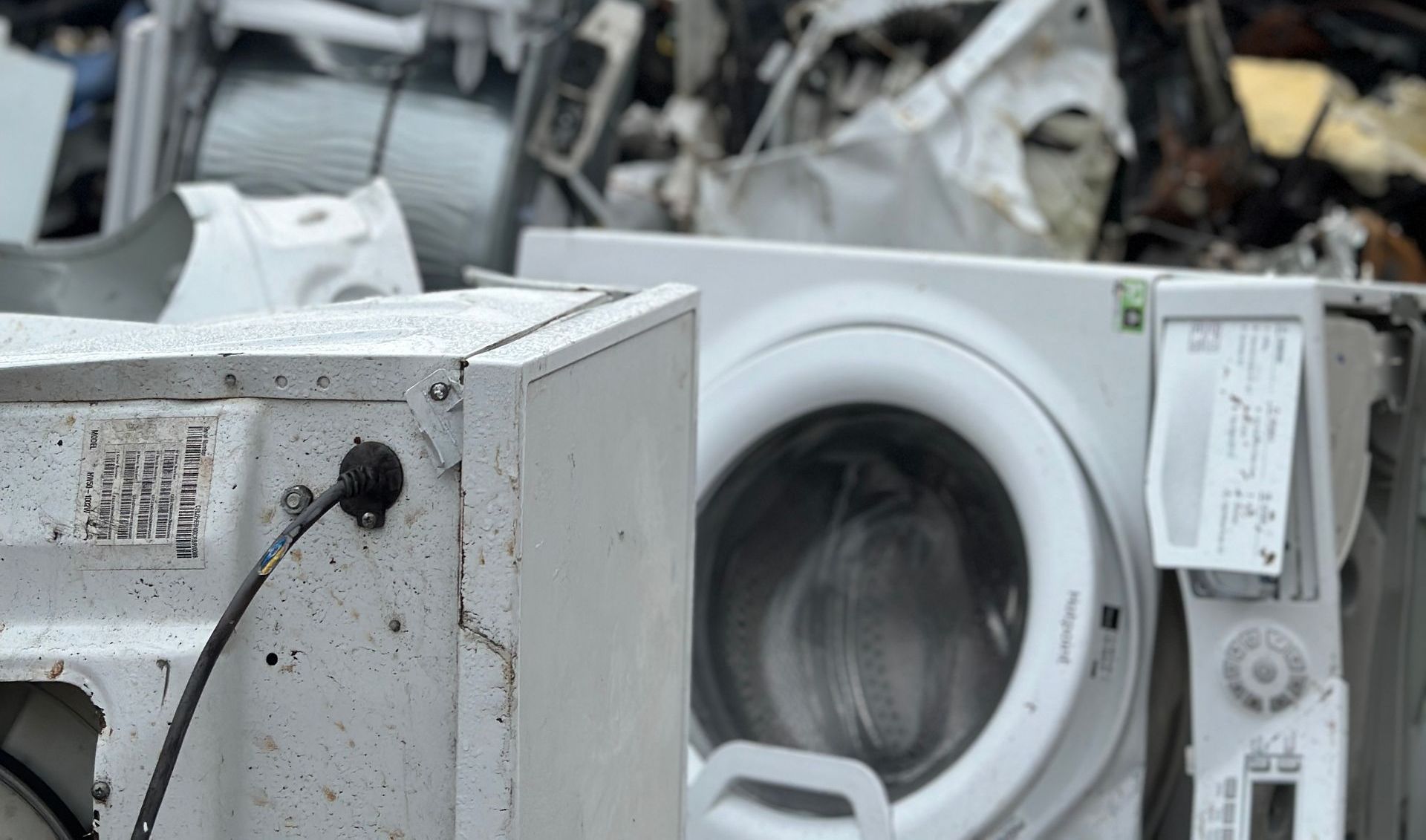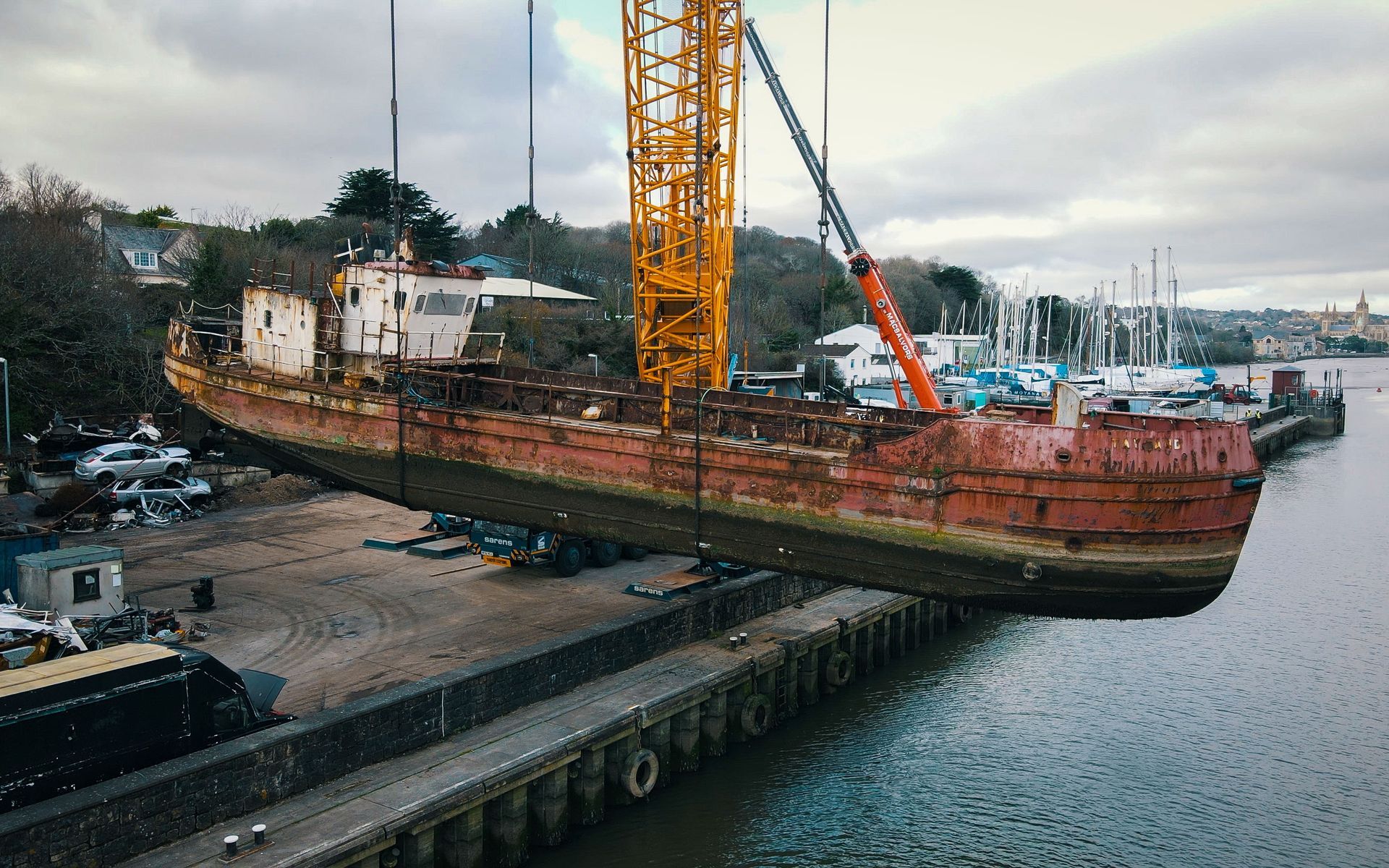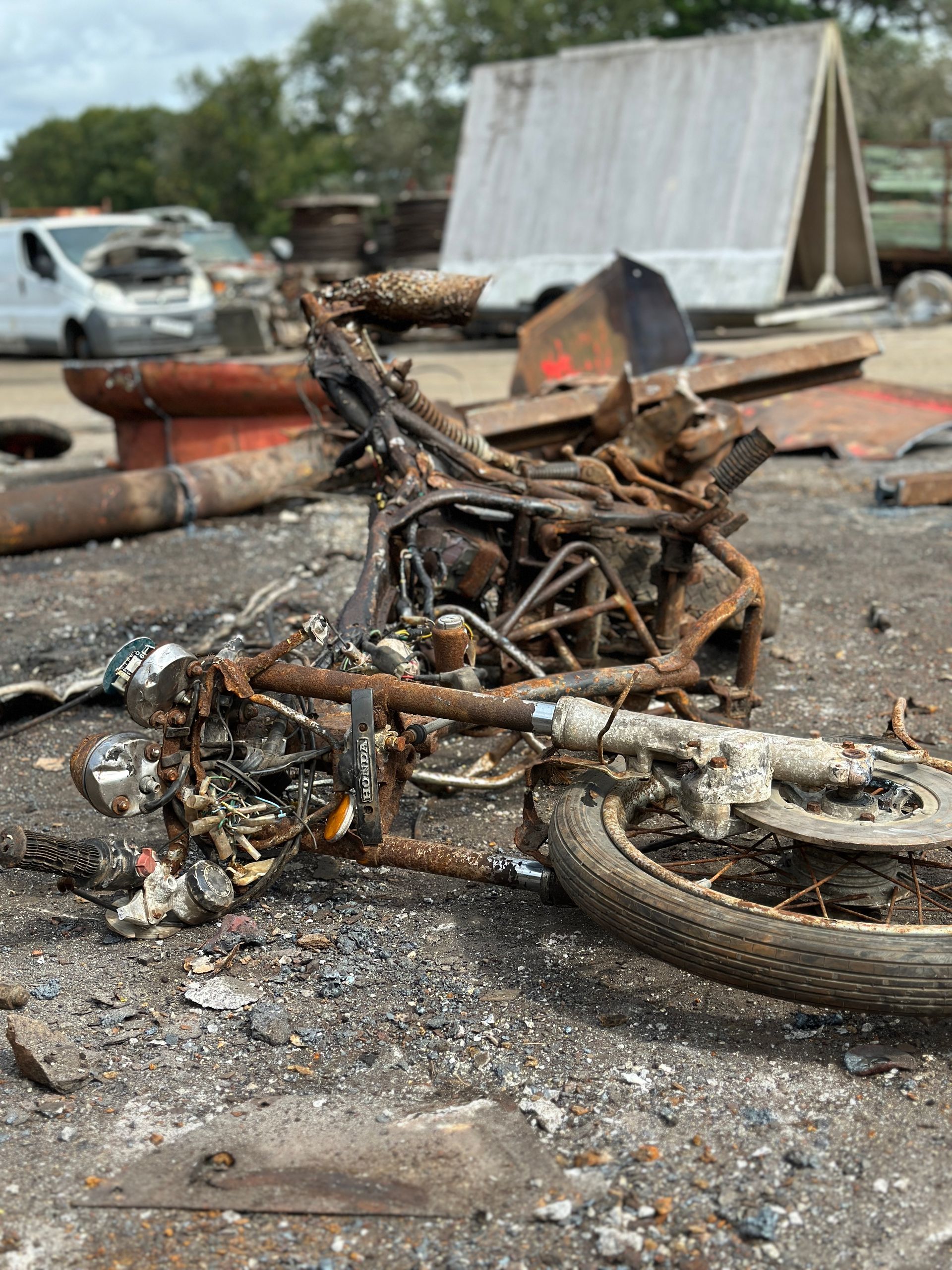WHAT ARE WHITE GOODS AND CAN YOU RECYCLE THEM AT THE SCRAP YARD?
September 11, 2023

OVERVIEW
With environmental legislation changing all the time white goods have become harder to recycle or disposed of correctly, at Truro Recycling we’re here to help guide you through the recycling process.
Firstly, what are white goods? Also known as light iron in the scrap yard white goods can often be found around the average household. Some popular items are washing machines, dishwashers, microwaves and the list goes on! If you haven’t noticed the pattern between those items yet they’re all very bulky containing a higher plastic content and not metal…
DISPOSING OF WASTE PROPERLY
When your larger household appliances stop working it’s important to make sure that they are being disposed of correctly with a company who are a registered waste carrier, A licensed carrier will be able to provide you with a paper trail off where your discarded equipment will end up or is going, you can check for legal local waste companies using this link (https://environment.data.gov.uk/public-register/view/search-waste-carriers-brokers) Should you need to find out more information about the company or person collecting your waste you can contact the environmental agency who will be able to guide you through the correct process.
Why is using a registered waste carrier important? A registered waste carrier will ensure that your white goods end up in the correct facility to begin their recycling/disposal journey. In some cases, waste collection companies can fly tip the waste you have just paid to dispose of and if they are unreachable which in most cases is what happens you as the waste holder will be liable to pay the fines and arrange for another collection, so cheaper is not always better in most cases…
THE VALUE OF WHITE GOODS
Although white goods have a much higher plastic content to metal, they still retain some value, but this will vary depending on who and how you recycle.
In most cases your larger household appliances won’t be worth anything if you have them collected but if you decide to drop them in to a yard such as ourselves Truro Recycling you could be walking away with a few extra pounds, every facility runs differently and we all have our own in house policies when it comes to payments for different items so it’s always best to check with the company first before getting your hopes up!
Buy Hey if you can get someone to collect your waste for free it’s a win win in my eyes.
CHARGABLE ITEMS
Unfortunately, not all white goods are worth money, and this will vary from yard to yard like I mentioned above, as a waste management company we have legislations to follow, and we must be strict with these to ensure we are working at the same standard as other businesses across the country.
The most common household items which we more than likely all have is a Fridge/Freezer and these have become increasingly more difficult to recycling and dispose of properly! If anyone ever tells you that they can correctly dispose of a fridge for free they’re lying and more than likely going to irresponsibly Destroy the item, by doing this could potentially cause harm to environment around it.
The cost to dispose of a fridge/freezer properly should cost you around £60-£100 but this will vary friend site to site. In addition to a disposal fee, you will probably have to pay a consignment note fee of around £25 which is a hazardous form every business dealing with fridges has to provide by law, so make sure you get your copy when responsibly recycling.
All information provided throughout this write up is based on facts and personal experiences whilst dealing with white goods throughout my time at Truro Recycling Ltd, if you would like to know any more information please get in touch via our contact form,
Thank You for Reading
Roman Drew
Environmental Manager at Truro Recycling Ltd

As the world moves closer to sustainable living and environmental responsibility, there are niches within recycling that often go overlooked. One such niche is boat breaking, and in the heart of Cornwall, only one company stands tall as the licensed authority on this task - Truro Recycling Ltd. Let’s dive into why being the sole licensed boat breaker in the region is not just a title, but an emblem of ecological responsibility. Preserving Cornwall’s Natural Beauty Cornwall, known for its breathtaking coastlines, picturesque landscapes, and rich maritime history, deserves every effort to maintain its natural charm. Old, derelict boats can be a blight on the landscape, and disposing of them irresponsibly can cause irreversible environmental damage. As the only licensed boat breaker in Cornwall, Truro Recycling Ltd takes on the significant responsibility of ensuring that the region remains unsullied. Sustainable Boat Disposal Boats, unlike many other vehicles, are complex structures made of a variety of materials – wood, fiberglass, metals, and various synthetic materials. Simply abandoning or improperly disposing of boats can lead to leaching of harmful chemicals into the environment. Being a licensed boat breaker means having the expertise and equipment to dismantle these vessels safely and sustainably. Economic Relevance Boat breaking isn’t just about getting rid of old boats. The process involves recycling valuable materials and parts, which can be reintroduced into the market. This not only generates economic value but also reduces the demand for virgin raw materials, promoting a circular economy. Ensuring Compliance and Standards Being licensed carries with it the obligation to meet stringent standards. Truro Recycling Ltd, therefore, ensures that each boat breaking operation meets the required environmental and safety standards. This ensures that the residents of Cornwall can trust the process and the company handling it. Encouraging Responsible Ownership The existence of a licensed boat breaker in the region encourages boat owners to be more responsible. Knowing that there's a proper channel for disposal, owners are less likely to abandon their vessels, ensuring that the maritime tradition of Cornwall continues with respect and responsibility. Conclusion The role Truro Recycling Ltd plays in Cornwall’s environmental protection is paramount. While boat breaking may seem like a small cog in the large wheel of recycling, its impact, especially in a region with such a storied maritime history, is monumental. By taking the responsibility of being the sole licensed boat breaker in Cornwall, Truro Recycling Ltd is not just disposing of old vessels but safeguarding the future of Cornwall's pristine coastlines and waters.

The Importance of Scrap Metal Recycling Yards for the Environment In the age of sustainability, when every aspect of our lives is being re-evaluated to reduce environmental impact, the role of scrap metal recycling yards cannot be overlooked. These facilities are more than just giant junkyards; they serve as crucial pillars in our efforts to curb environmental degradation and promote a circular economy. Here are the key reasons why scrap metal recycling yards are essential for the environment: Resource Conservation: Metals are finite resources, extracted through mining operations that not only deplete our natural reserves but also cause significant environmental damage. Recycling scrap metal ensures that we make the most of the resources already extracted, reducing the demand for fresh mining. Energy Savings: Producing new metals from ore requires a lot of energy, especially in the smelting process. Recycling metal, on the other hand, consumes only a fraction of that energy. For instance, recycling aluminum saves up to 95% of the energy needed to produce it from raw materials. Reduction in Greenhouse Gas Emissions: Mining and metal production processes release a substantial amount of greenhouse gases. By reducing the need for these processes, scrap metal recycling helps in curbing emissions, which aids in the fight against global warming. Prevention of Landfill Overloading: Dumping scrap metal in landfills is not only a wasteful use of resources but also fills up the landfill space quickly. Since metals don’t decompose like organic materials, they can remain in the environment for centuries. By recycling them, we ensure that valuable landfill space is reserved for non-recyclable waste. Economic Benefits: Recycling creates jobs. In fact, according to various studies, recycling can create many more jobs than simply dumping waste in landfills. This not only promotes a green economy but also aids in community development. Reduction in Water and Air Pollution: Mining can lead to water pollution due to acid mine drainage and other contaminants. Moreover, the refining process of metals can contribute to air pollution. By reducing the demand for freshly mined metals, we can cut down on these polluting aspects. Promotion of Innovation: As the demand for recycled metal grows, so does the technology and innovation around recycling processes. This has led to more efficient ways to recycle and repurpose metals, promoting a culture of sustainability and innovation. Supporting a Circular Economy: A circular economy aims to eliminate waste and ensure that resources are used to their maximum potential. Scrap metal recycling is a perfect example of this, where metals are collected, processed, and reintroduced into the production cycle, again and again. Conclusion: Scrap metal recycling yards, often overlooked, are environmental lifelines in our modern world. They not only prevent further degradation of our environment but also promote a sustainable and economical approach to resource management. Next time you see a piece of scrap metal, think of it not as waste, but as a vital component in our journey towards a more sustainable future.